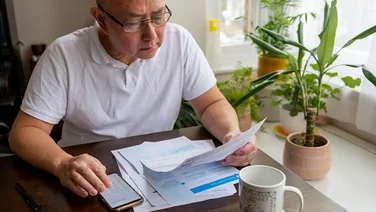We receive a small fee from trusted installers when you request a quote through our site. This helps us keep our content independent, well-researched and up to date – Learn more
- Energy regulator to make suppliers offer more choice in how they pay
- The tariffs will be available by end of January 2026
- They are unlikely to reduce energy bills

Energy suppliers will have to offer customers at least one lower standing charge tariff and give households more choice in how they pay fixed costs, Ofgem has announced.
Following a consultation, the regulator has said the proposal will apply to all suppliers and new tariffs will be available in England, Scotland, and Wales by January 2026.
Standing charges cover the fixed costs of delivering energy to peoples’ homes and businesses, including the cost of essential maintenance and infrastructure upgrades.
If you’d like more information on government grants for solar panels, read our dedicated page.
Ofgem has also made it clear that it cannot remove the standing charge from the system and can only move from one part of the bill to another, but it will be carefully considered how to offer more choice for how customers pay these costs.
This means the new tariffs are unlikely to reduce bills because tariffs with a lower standing charge will have a higher unit rate and that customers should consider their circumstances and seek advice from their supplier or consumer groups.
Tim Jarvis, director general, markets, Ofgem, said the regulator has “carefully considered” how it can offer more choice without making customers worse off.
“After examining all the options available to us, we believe the right way forward is to require all major suppliers to offer at least one tariff with a lower standing charge,” he explained.
He said it will offer more choice to customers without having a detrimental impact on those with high energy needs, like those who rely on energy for medical reasons.
“The sector has already shown us it’s possible with some suppliers voluntarily offering low- or no-standing charge tariffs, but we need to see widespread availability across the market, so this choice is available to everyone,” Jarvis explained.
He has warned, though, that costs covered by the standing charge ultimately “must be paid”. These cover the costs of transporting energy to homes and business and ensuring continuous investment for future-proofing the system.
This means the charges cannot be removed entirely, but instead moved around, giving households more choice.
Martin McCluskey, minister for energy consumers, said that the move will mean households will have more choice over the tariffs they choose and give people “more options to pay lower standing charges”.
He described it as “an important step” towards building an energy market that protects billpayers.
Ofgem is also planning to tackle the growing impacts of rising debt in the energy system by establishing a fund called the Debt Relief Support Scheme, which suppliers would use to either write off debt that is so significant it will never be paid back or help pay off debt by ‘debt matching’ customer payments.
Ofgem has also set out proposals to make it easier for consumers to get help from charities and debt support agencies and ensure a consistent approach is taken across the board.









